The brother of a man killed during a mass shooting in Nova Scotia almost three years ago says he’s keen to make sure recommendations from a public inquiry released Thursday are implemented.
“It’s great to have things move forward,” Scott McLeod told a news conference in Truro, N.S., a community about a 30-minute drive east of where the shooting started on the night of April 18, 2020. “There’s still a lot of stuff to be done with the recommendations .... It’s going to give some sort of closure because this chapter is done.”





